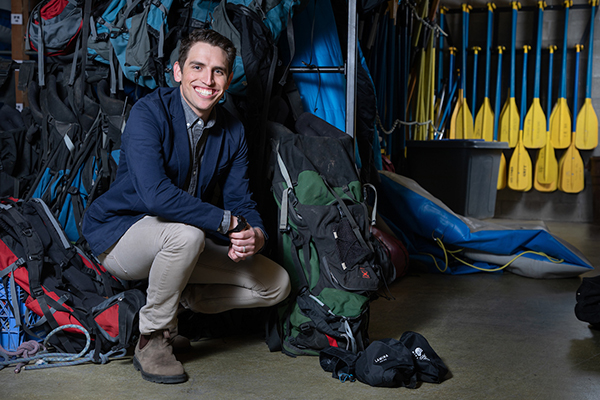UM Campsite Researcher to Present National Academy of Sciences Lecture
MISSOULA – For a nation that loves to camp, the past few summers have been fraught with more than mosquitoes and getting damp firewood to light. For many, just landing a site at a national park has been a logistical landmine, requiring more flexibility and fortitude than folding a 12-person tent alone.
Will Rice, assistant professor of outdoor recreation and wildland management at the University of Montana, has studied this subject in depth. He will talk about the scarcity and rising demand for campsites – and the unintended income and racial inequities that come with it – at an upcoming National Academy of Sciences Distinctive Voices lecture.

UM Assistant Professor Will Rice will talk about the scarcity and rising demand for National Park Service campsites – and the unintended income and racial inequities that come with it – at an upcoming National Academy of Sciences Distinctive Voices lecture.
Rice’s lecture, “When the Last Campsite Fills: Allocation of Outdoor Recreation in an Age of Extreme Scarcity,” is open to the public and will be held online at 8 p.m. (MDT) Wednesday, June 22. The link to the livestream is online at https://livestream.com/nasem/0622rice and registration is available at http://www.nasonline.org/programs/distinctive-voices/upcoming-events.html.
The event is part of a prestigious lecture series that features experts in science, engineering and medicine who discuss innovations, discoveries and emerging issues in their field.
“Right now, if you are trying to reserve a spot for a specific date in a popular federally managed campground, you may have a 3% chance of actually getting it,” Rice said. “To succeed you need a host of advantages like flexible work schedules and high-speed internet, and for those with lower-income jobs or living in rural areas, that can be a real problem.”
In his lecture, Rice will share results from a recently published study that he and colleagues at the W.A. Franke College of Forestry & Conservation conducted, which used big data to explore inequities in the national park system.
Rice also will talk about a campground project he worked on in the past year with colleagues at the University of California, Santa Barbara, Bren School of Environmental Science & Management.
Rice served an advisor with Dr. Kaitlyn Gaynor of the National Center for Ecological Analysis and Synthesis and Bren’s Dr. Frank Davis, to “two brilliant students”– Clarissa Boyajian and Halina Do-Linh – who created a pilot app that allows people to analyze patterns in access to and demand for federally-managed campsites.
“It beautifully underscores what we found in our published research,” Rice said.
Rice is currently meeting with the National Park Service and others in the field on possible remedies to level the access to federal campgrounds, and he plans to do more research on the subject in the coming months.
“Federal agencies are very interested in addressing these discrepancies and identifying best practices moving forward,” Rice said.
###
Contact: Dave Kuntz, UM strategic communications director, 406-243-5659, dave.kuntz@umontana.edu.